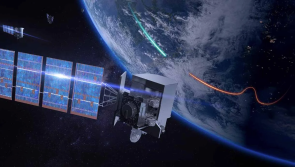Space Force chief concerned about ‘backdoor’ for attacking satellite communications

The Ukraine-Russia war is highlighting alternative ways that adversaries can attack satellite communications, the U.S. Space Force’s top officer told reporters Tuesday.
Chief of Space Operations Gen. Chance Saltzman said the ongoing conflict demonstrates that the space and cyber domains are “inextricably linked” when it comes to warfighting.
“Satellites in space are not useful if the linkages to them and the ground network that moves the information around that you get from satellites is not assured, is not capable, is not accessible. And so I think we’ve witnessed some cyber activity that has hurt satellite operations. And so I think it’s a reminder that we think about satellite operations, but if we’re not thinking about cyber protection of our ground networks, that we may have a backdoor, if you will, to negate satellite operations without [conducting direct] counter-satellite operations — that there’s other ways to attack these systems,” Saltzman said during a meeting with reporters at the Pentagon.
It’s no secret that space capabilities are critical to modern warfare, and both Ukraine and Russia recognize that, he noted.
“Right out of the gate, we saw both sides attacking satellite operations to degrade command and control. We see a lot of GPS interference to degrade those kinds of capabilities. So clearly if right out of the gate you’re trying to degrade those capabilities, you recognize that they are central to operations, that they are important to how a force fights in the modern environment … It’s important to recognize just exactly what can go wrong if you don’t plan for that,” Saltzman said.
Ukrainians have relied on Starlink satellite communication capabilities provided by SpaceX as their other comms systems have been put at risk.
“It’s been huge in terms of their ability to communicate, and then to coordinate planning and operations,” a senior U.S. military official told reporters during a background briefing in October.
The conflict is unfolding as the U.S. military plans to increasingly rely on commercial space tech to enhance its satcom capacity.
“I think the Ukrainian use of the Starlink constellation demonstrated beyond a shadow of a doubt that there’s good viability in commercial augmentation for — in terms of satellite support to military operations,” Saltzman said.
“And the other thing that I kind of learned as an adjunct to that is that proliferated constellations in low-Earth orbit for satellite communications [are] much harder to degrade. It’s a tougher problem, in this case for the Russians. And so proliferation of constellations, commercial augmentation support to the military — I think we have to recognize that there’s some lessons to be learned there,” he added.
Saltzman’s observations came as the Pentagon’s Space Development Agency is moving forward with plans to put new constellations of satellites in low-Earth orbit to bolster the U.S. military’s data transport and sensor networks as part of a new “proliferated warfighter space architecture” (PWSA), which is expected to underpin the Defense Department’s ability to implement its Joint All-Domain Command and Control (JADC2) concept.
At NSSA’s Defense and Intelligence Space Conference last week, Frank Calvelli, assistant secretary of the Air Force for space acquisition and integration, said Pentagon officials are looking at potentially taking “all the comm requirements and stack ‘em and then figure out can we allocate a chunk of these to commercial. And I think that’s a really good approach.”
At the same NSSA conference, Lt. Gen. John Shaw, deputy commander of U.S. Space Command, also called for doing more to leverage commercial tech. However, he also warned that those types of systems could be at risk from adversaries’ cyber weapons or other capabilities.
“There will have to be better collaboration between the commercial sector and the national security sector to understand potential threats in space,” Shaw said.






